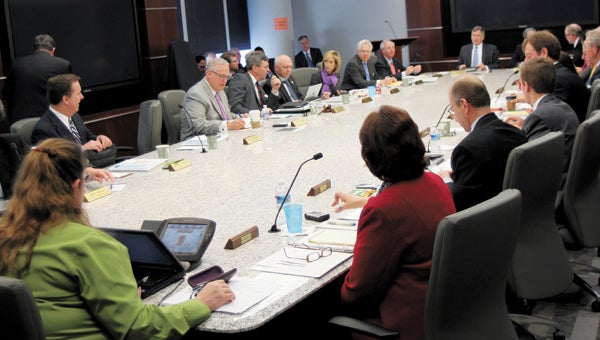VPA punts port bids
Published 10:40 pm Tuesday, March 26, 2013

Virginia Port Authority commissioners meet in Norfolk Tuesday to decide the way forward for the Port of Virginia. They decided against accepting either of two bids from private groups, opting instead to restructure and reform current operator Virginia International Terminals.
Ten months after an unsolicited bid from APM Terminals started a contentious debate over whether Virginia should sell the rights to its marine terminals, a board has decided against taking the money in favor of restructuring and reforming the current operator.
On Tuesday, Virginia Port Authority commissioners decided to throw out APM’s offer, along with a counteroffer from investment bank JP Morgan, in favor of sticking with Virginia International Terminals.
The unanimous decision, which came about noon after a 2 ½-hour closed session — apparently to further discuss the options — was delivered to a packed boardroom at the VPA offices inside Norfolk’s World Trade Center.
“We have spent some serious time thinking about this,” was board chairman William Fralin’s first post-decision comment. “There were a lot of people that undertook a yeoman’s effort in getting us to a position where we were able to make a decision.”
In deciding to stick with VIT, commissioners turned down a $3.9-billion offer from APM to operate the marine terminals for 48 years, as well as JP Morgan’s $4.66-billion, 50-year offer.
APM’s offer, lodged under the state’s Public-Private Transportation Act, was revealed last May. The rival JP Morgan bid was originally presented by RREEF America, part of the Deutsche Bank Group. An earlier third offer from Carlyle Infrastructure Partners, an infrastructure investment unit of the Carlyle Group, was withdrawn.
The offers were “competitive” and “worthy of us spending a lot of time on,” Fralin said, but in the end not strong enough.
The decision, he said, hinged to a large degree on how best to fund an expansion of the Port of Virginia — whether to use private money but give up future profits, or overhaul VIT and retain more ongoing revenue for the commonwealth.
“Do we take private money and take risk off the table, and also some of the upside off the table … or do we look at our operation and believe that we can get them revamped?” Fralin rhetorically asked.
“We thought the offers were competitive, but they weren’t compelling; that’s part of the reason why we made this decision.”
But though the port operator won’t change, it still won’t be business as usual. The board will convert VIT from a non-stock corporation to a single-member limited liability company more directly under the control of the VPA, an effort to “eliminate duplications, increase efficiencies and reduce costs.”
“We really think we are going to be able to transform not only throughput, but also the homegrown customer base,” Fralin said.
Throughout the lengthy decision-making process, punctuated by fiery public meetings and political grandstanding, opinion has largely remained on the side of VIT.
Edward O’Callaghan, president of Suffolk-based trucking firm Century Express and also president of the Tidewater Motor Truck Association, is one who lobbied strongly against any long-term lease.
Leaving the VPA offices after the board meeting Tuesday, he commented: “What happened here was a perfect mix of good old Virginia politics and good business reason, and that’s what made this outcome — that’s what I believe.”
In a statement, its Americas Region president Eric Sisco said, “APM Terminals is disappointed with the decision. In deference to the PPTA process we will have no additional comment at this time.”
All eyes will now be on Gov. Bob McDonnell, who thanked commissioners for their work and stated that he and Transportation Secretary Sean Connaughton would review documents regarding the board’s decision before McDonnell issues a statement on it. McDonnell and Connaughton have been viewed as proponents of leasing port operations,
“We all share the goal of ensuring that taxpayers receive the best possible return on investment in Virginia’s world-class port facilities, and that the Port of Virginia assumes its place among the top shipping facilities in the country,” McDonnell stated.
Democratic gubernatorial candidate Terry McAuliffe stated he is pleased that commissioners “voted against privatization,” and his Republican opponent in the forthcoming state election, Attorney General Ken Cuccinelli, called the decision “an important step to preserve the Port of Virginia as a unique Virginia resource.”
Delegate Chris Jones, Suffolk’s representative in the General Assembly, said it was the right decision.
The offers considerably undervalued the port, he said, and it wouldn’t have made sense to “lock up the asset for a generation and a half.”
Jones said he worked closely with Fralin to draft the legislation he introduced during the recent session that will prevent future unsolicited port proposals under the PPTA.






